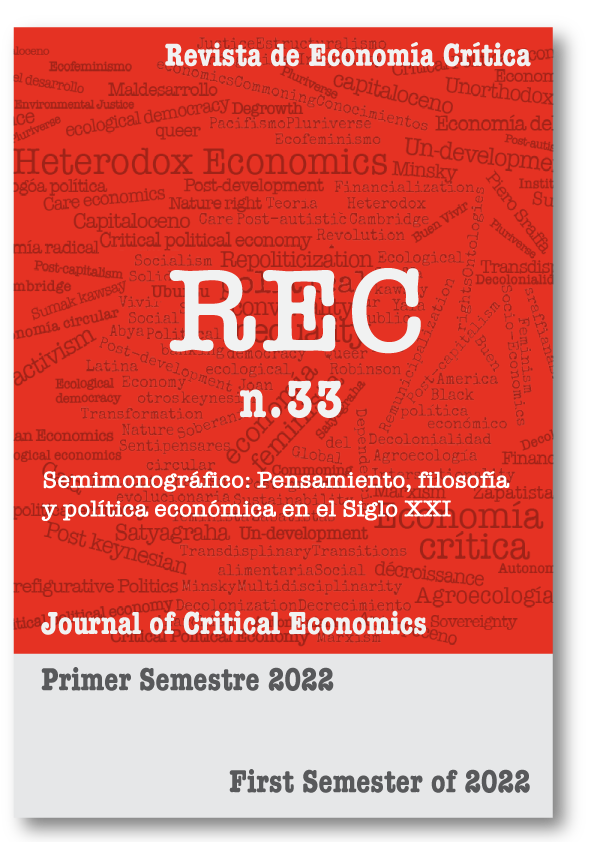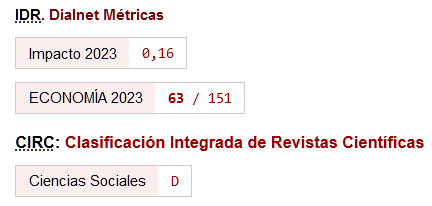La planificación en la política económica del siglo XXI. Esbozo de una alternativa viable.
DOI:
https://doi.org/10.46661/rec.10482Keywords:
Economic policy, Planning, Technical progressAbstract
The beginning of the 21st century has been characterized by the eclosion of two crises, the financial crisis of 2008 and the health crisis of 2020, which have introduced serious limits to the maintenance of the economic growth model that appeared in the 1980s. The new economic conditions demand a new type of economy. This article aims to approach the characteristics of a new economic policy structure, which could be pinned down from a critical point of view.In the new situation of uncertainty and of a future conditioned by innovation, a new dimension of economic policy can be planning and, in particular, of an indicative type. This article outlines a new type of planning adapted to the new conditions of the 21st century. For its configuration, real experiences have been used as references, such as those carried out previously in different European countries in the 20th century, but the current Chinese perspective has also been taken into account. At the same time, the theoretical-practical ideas of Mariana Mazucatto, John K. Galbraith or the situational planning approach of Carlos Matus have been explicitly considered.A change in economic policy-making, both in its content and in its structure, is essential in the countries that were once called developed, if they intend to maintain their level of economic activity and the living conditions of their populations. Not addressing such changes will mean an economic crisis in those countries that will negatively consolidate their conditions in the 21st century.
Downloads
References
Andreoni, Antonio and Chang, Ha-Joon (2019). "The Political Economy of Industrial Policy: Structural Interdependencies, Policy Alignment and Conflict Management". Structural Change and Economic Dynamics, 48 (March), pp. 136-150. https://doi.org/10.1016/j.strueco.2018.10.007 DOI: https://doi.org/10.1016/j.strueco.2018.10.007
Acemoglu, Daron and Robinson, James A. (2012). Por qué fracasan los países. Los orígenes del poder, la prosperidad y la pobreza. Deusto, Barcelona.
Anchishkin, Aleksandr I. (1986). Nauka - tejnika- ekonomika (Ciencia - técnica - economía). Ekonomika, Moscu (en ruso).
Balogh, Thomas (1982). "Los problemas de la planificación en Gran Bretaña" en Holland, S.. La superación de la planificación capitalista. Oikos-tau, Vilassar del Mar, pp.139-154.
De la Vega, Ángel (1988). "Desarrollo, crisis y perspectivas de la planificación francesa". Investigación económica, 184 (abril-junio), pp. 63-90.
Delors, Jacques (1982). "El ocaso de la planificación francesa" en Holland, Stuart. La superación de la planificación capitalista. Oikos-tau, Vilassar del Mar, pp. 31-54.
Denton, Geoffrey et al. (1970). Planeación y política económica en la Gran Bretaña, Francia y Alemania. Siglo XXI, México.
Dobb, Maurice (1971). El nuevo socialismo. Oikos-tau, Vilassar del Mar.
Fernández, Antonio (1974). Teoría de la planificación. Facultad de Ciencias Económicas y Empresariales (Universidad Complutense de Madrid), Madrid.
Galbraith, John Kenneth (1956). El capitalismo americano. El concepto de poder compensatorio. Ariel, Barcelona.
Galbraith, John Kenneth (1975). La economía y el objetivo público. Plaza y Janés, Espluges de Llobregat.
Gregory, Paul R. (2021). "The Soviet Economic System: An Archival Re-evaluation" en VV.AA.. The Palgrave Handbook of Comparative Economics. The Hoover Institution (University of Stanford), Stanford, pp. 47-65. https://doi.org/10.1007/978-3-030-50888-3_3 DOI: https://doi.org/10.1007/978-3-030-50888-3_3
Hirschman, Albert O. (1977). "Enfoque generalizado del desarrollo por medio de enlaces con referencia especial a los productos básicos". El trimestre económico, 44 (1), pp. 199-236.
Hirschman, Albert O. (1980). "Auge y ocaso de la teoría económica del desarrollo". El trimestre económico, 47 (4), pp. 1055-1077.
Leeds, Adam E. (2019). "Administrative Monsters: Yurii Yaremenko's Critique of the Late Soviet State". History of Political Economy, 51, annual suppl., pp. 127-151. https://doi.org/10.1215/00182702-7903264 DOI: https://doi.org/10.1215/00182702-7903264
Matus, Carlos (1993). El método PES. Planificación estratégica situacional. CEREB-Altadir, Neuquén (Argentina).
Matus, Carlos (2007). Teoría del juego social. Universidad Nacional de Lanús, Buenos Aires.
Matus, Carlos (2020). Adiós, señor presidente. EDUNLa Cooperativa, Buenos Aires (primera edición de 1987). https://doi.org/10.18294/9789874937681 DOI: https://doi.org/10.18294/9789874937681
Mazzucato, Mariana (2014). El estado emprendedor. Mitos del sector público frente al privado. RBA libros, Barcelona.
Mazzucato, Mariana (2021a). Misión economía. Una guía para cambiar el capitalismo. Taurus, Barcelona.
Mazzucato, Mariana (2021b). No desaprovechemos esta crisis. Galaxia Gutenberg, Barcelona.
Nove, Alec (1982). El sistema económico soviético. Siglo XXI, México.
Pitigliani, Fausto (1933). The Italian Corporative State. P.S. King and Son, Londres.
Rodrik, Dani (2011). Una economía, muchas recetas. La globalización, las instituciones y el crecimiento económico. Fondo de Cultura Económica, México.
Rodrik, Dani (2016). Las leyes de la economía. Aciertos y errores de una ciencia en entredicho. Deusto, Barcelona.
Rodrik, Dani (2018). Hablemos claro sobre el comercio mundial. Deusto, Barcelona.
Sánchez, Antonio (2020). "Política económica en China" en Sánchez, A. y Tomás, J.A.. Política Económica 2019. Tirant lo Blanch, Valencia, pp. 27-37.
Stiglitz, Joseph (2021). Reescribir las reglas de la economía europea. Antoni Bosch, Barcelona.
Tinbergen, Jan (1961). Política económica. Principios y formulación. Fondo de Cultura Económica, México-Buenos Aires.
Tinbergen, Jan (1968). Planificación central. Aguilar, Madrid.
Yaremenko, Yuriy V. (1998). Ekonomicheskie besedy (Conversaciones económicas). Tsentr issledovaniy i statistiki nauki, Moscú (en ruso).
Yaremenko, Yuriy V. (2000). Teoriya i metodologiya issledovaniya mnogourovnevoy ekonomiki (Teoría y metodología de la investigación de una economía multinivel). Nauka, Moscú (en ruso).
Zahariadis, Nikolaos (2003). Ambiguity and Choice in Public Policy: Political Decision Making in Modern Democracies. Georgetown University Press, Washington DC.
Downloads
Published
How to Cite
Issue
Section
License

This work is licensed under a Creative Commons Attribution 4.0 International License.
This licence allows third parties to share (copy and redistribute the material in any medium or format) and adapt (remix, transform and create from the material for any purpose, including commercial purposes), provided that authorship and first publication in this journal (The Journal, DOI of the work) is acknowledged, a link to the licence is provided, and it is stated whether changes have been made to the work.







